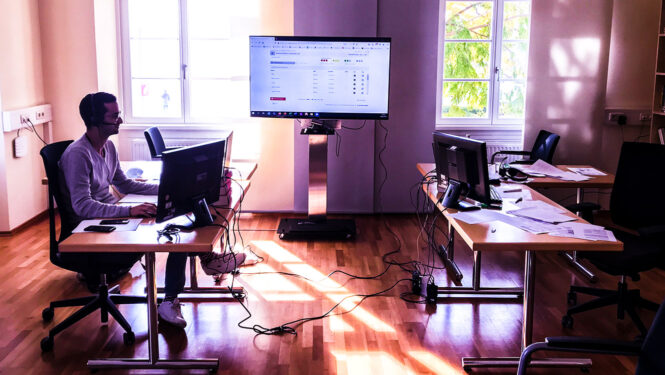News
Online & activity-based soft skills training

Collaboration and leadership skills can be trained most efficiently through person-to-person interactions.
With interpersonal Skills LAB, this is also possible online. While the participants communicate with each other via any webinar solution (which supports «breakout sessions»), they dive into virtual space via web browser. Each participant is part of a 2- or 3-person crew. Via the individual cockpits «Main Deck», «Support Deck» and «Commander Deck», they control their spaceship, which, as commonly known, «suddenly» has a major malfunction and confronts the teams with real challenges: Time pressure, information overload, distributed knowledge, complexity, …
As in the face-to-face courses, also online the learning process takes place through direct interaction between participants, is accompanied by professional trainers and is amplified by behavioural measurement.
Interview – Jakob Löser (trainer and consultant at Die Akademie) reports: What experiences did Die Akademie gather with the online «LAB» in the past weeks?
NINECUBES: How did your participants experience this form of training?
Jakob Löser: All participants were involved in the missions with a lot of fun and ambition. This made typical behavioural patterns visible, some of which were familiar to the participants, but some of which were new. The self-reflection was perceived as very intensive and exhausting – which is allowed to happen in training. In these individual reflections, the virtual room can offer the advantage that each participant really stays with him/herself and turns off the camera and microphone for 10 minutes to concentrate on him/herself. Afterwards, their own insights and thoughts can be exchanged and discussed in virtual pair work.
9C: As a trainer, how did you feel about the facilitation?
JL: After the two days, we were all (participants and trainers) of course exhausted! Normally, I would rather not conduct a virtual training within two whole, consecutive days. Through good break management and especially the special approach in the interpersonal Skills LAB training (preparation – mission – reflection – evaluation), we were able to work in a concentrated and goal-oriented way throughout, even though we were all «only» connected via webcam and screen.
9C: What particular challenges did you face (compared to using the «LAB» in a face-to-face context)?
JL: For some participants, even the operation of web conference software is a real challenge … although this has now become a basic skill like reading and writing since 2020 (laughs).
Of course, there were sometimes technical difficulties due to slow internet connections for individual participants.
Unusual for us as trainers is that we cannot see and observe all participants at the same time during the simulation rounds. This makes us very dependent on the feedback and observations within the groups and we also hand over this responsibility to the participants.
9C: How did you master these challenges?
JL: Allow enough time for the participants’ small technical issues at the beginning.
The sometimes slow internet connections naturally increase the difficulty in the missions (short delays in the displays between the different decks). These additional boundary conditions and the way the participants deal with them could be well integrated into the behavioural evaluation in a very revealing way.
For the observation and debriefings of the simulation rounds, we have set up a «Mission Control» here in Überlingen. On a large screen we see the current mission data of the individual teams. Thanks to double facilitation, we can observe 2 teams at a time in the breakout sessions. After the simulation rounds, we also have the participants report their experiences. This helps to close our observation gaps and provide qualified feedback together with our observations and the measured result data. The biggest lever for this is the emphasis on the self-responsibility of the participants.
9C: Please be more specific about the «self-responsibility of the participants».
JL: In my opinion, a «LAB»-based training can only be truly exceptional if the participants engage in the missions with their whole personality and also give each other honest and critical feedback afterwards. This is true in the face-to-face version and even more so in the virtual one. Because we can be less «close to the participants» in the virtual space (we receive fewer verbal and non-verbal signals as feedback), we have to trust that they will do their best to participate and use the opportunities we offer. By the way, I think this is also generally in line with the principles of good leadership and cooperation.
9C: Spontaneously – What were the insights gained by the participants on the topic of leadership in the last training?
JL: How important it is to really understand the background of others’ behaviour, even though you don’t find it appropriate;
How difficult it can be to give critical feedback;
What effect can be achieved by reinforcing the strengths of others and not focusing on the weaknesses;
What dynamics arise when new team members join well-established teams; …
For me, the beauty of this form of training is that there are no clear, firmly defined learnings that each participant has to take away. Because of the different personalities and different constellations, each participant takes something different with them. The participants definitely find these things in their everyday life and were able to prepare for them in a playful way and in a protected setting.
9C: Thank you very much for giving us insight into «Mission Control» Überlingen and good luck for the future!
Further information on the training provider:
Akademie für Führungskräfte der Wirtschaft GmbH
www.die-akademie.de